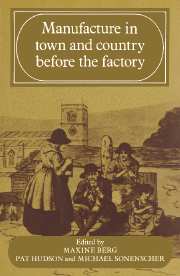Book contents
- Frontmatter
- Contents
- List of illustrations
- Acknowledgements
- 1 Manufacture in town and country before the factory
- 2 Political economy and the principles of manufacture 1700–1800
- PART I THE STRUCTURE OF MANUFACTURE
- PART II ‘WORK’ AND ‘WAGES’
- Appendix 1 Norwich embezzlement convictions in the eighteenth century: problems of evidence
- Appendix 2 Estimates of the size of the supplement to wages available through embezzlement in two eighteenth-century industries
- Appendix 3 Statutes concerned with embezzlement in the putting-out industries, 1500–1800
- Index
2 - Political economy and the principles of manufacture 1700–1800
Published online by Cambridge University Press: 16 October 2009
- Frontmatter
- Contents
- List of illustrations
- Acknowledgements
- 1 Manufacture in town and country before the factory
- 2 Political economy and the principles of manufacture 1700–1800
- PART I THE STRUCTURE OF MANUFACTURE
- PART II ‘WORK’ AND ‘WAGES’
- Appendix 1 Norwich embezzlement convictions in the eighteenth century: problems of evidence
- Appendix 2 Estimates of the size of the supplement to wages available through embezzlement in two eighteenth-century industries
- Appendix 3 Statutes concerned with embezzlement in the putting-out industries, 1500–1800
- Index
Summary
The problem I wish to confront in this essay is the extent to which contemporaries noticed and formulated the economic significance of the spread of manfacturing industry in the period just prior to the Industrial Revolution and the factory system. Historians have recently asserted the existence of a distinctive proto-industrial period, characterised by the proliferation of rural manufacturing by-employments. It therefore seems worthwhile to investigate the terms in which contemporaries themselves understood such development. What principles of manufacturing industry did these writers outline? Did they draw attention to the specifically rural nature of early industry, seeing in domestic industry the matrix of economic development as is now so fashionable and popular among historians and economists alike? What other concepts and principles of manufacture did they offer, and how did these intersect with wider economic and social awareness?
In order to compare contemporary perceptions with the historians' picture I propose to look at the analysis of manufacture in some of the economic writings of the mercantilist era and its aftermath in the later eighteenth century. This essay will focus on a relatively narrow group of writers – those whose works attempted to analyse economic improvement. Furthermore, it confines itself to a specific problem – the association, if any, made by these writers between manufacture and wider economic growth and welfare. The essay will look only at British writers whose description and analysis is related to the British experience of economic change and British institutions. The continental experience, notably that of France, was quite different. When the Industrial Revolution came to France, small-scale artisan production was conceived in a new light.
- Type
- Chapter
- Information
- Manufacture in Town and Country Before the Factory , pp. 33 - 58Publisher: Cambridge University PressPrint publication year: 1983
- 5
- Cited by



